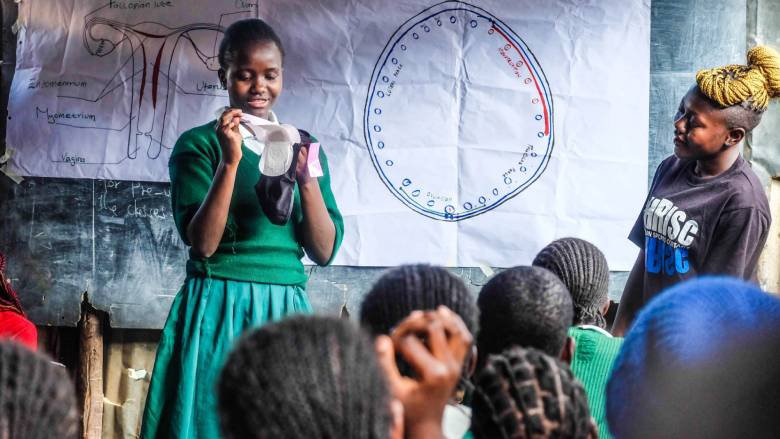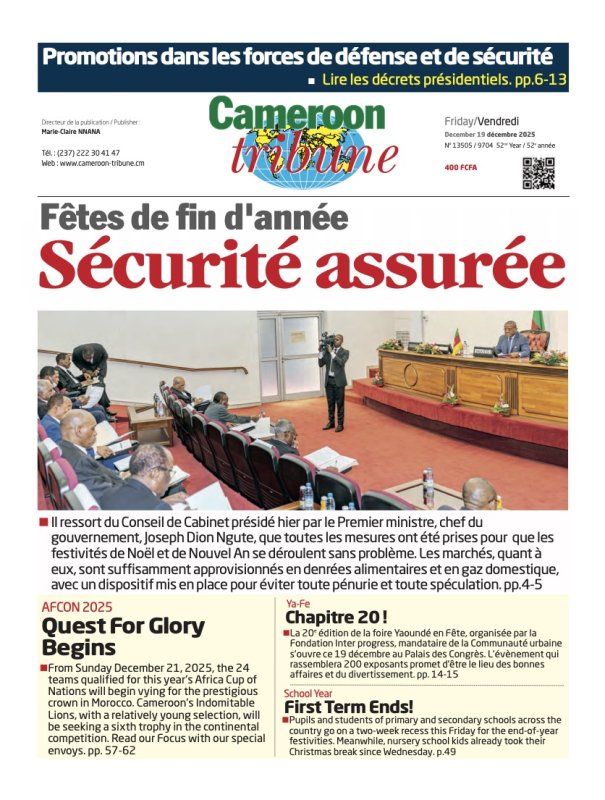Menstrual Hygiene Management : Enhancing Communication, Strengthening Access To Products
- Par Kimeng Hilton
- 23 Oct 2024 12:56
- 0 Likes

UNICEF, government and stakeholders held a town hall forum with the media in Yaounde on October 22, 2024.
There are more than 8 million women and menstruating girls in Cameroon. Women and girls aged 10-49 years are estimated at 30% of Cameroon’s population. Menstruation is a biological, natural, normal process experienced by all adolescent girls and women. Everyday, more than 800 million women aged 15-49 years have their period in the whole world.
Insufficient Knowledge
Yet, a whopping 66.7% of participants in a recent study in Cameroon said they had insufficient knowledge on the management of menstrual hygiene. This is explained by rigid social norms and cultural taboos that prevent open dialogue and discussions. Also, the availability and accessibility of appropriate products is a problem. Thus, access to affordable hygienic menstrual products remains limited.
Limited Access
As a result, 70% of menstruating women and girls in Cameroon do not have access to basic products for menstrual hygiene. Moreover, adolescent girls and women in urban areas are more likely to have regular and adequate access to sanitary napkins than those in rural areas. While only 18% of rural households have improved sanitation; and the number of schools with separate toilets for girls is limited.
Social Challenges
The social challenges of menstrual hygiene include stigma, hesitation, shame, a culture of silence around menstruation in society; ignorance of the seriousness of the neglect of menstruation, and the lack of management information on hygiene during menstruation. Other challenges are the physical and mental consequences due to negativity towards menstrual hygiene management; myths, misunderstanding and superstition; poor sanitation facilities leading to absenteeism during menstruation/dropping out of school.
Town hall Media Forum
It was for these reasons that the United Nations Children’s Fund, UNICEF, the government of Cameroon and stakeholders on Tuesday October 22, 2024 in Yaounde held a town hall forum with the media to discuss menstrual hygiene management. It was attended amongst others by UNICEF Cameroon Country Representative, Nadine Perrault.
The Menstrual Cycle
The menstrual cycle is “a repetitive series of changes in the lining of the uterus or endometria in preparation for receiving a fertilized egg.” This cycle repeats itself approximately every 28 days. The menstrual cycle begins at puberty (menarche) and lasts 30-40 years until menopause when hormones change and egg production stops.
Like In Other Countries
“There are many challenges confronting adolescent menstrual hygiene in Cameroon, like in many countries of the world. The greatest of all them is the lack of information because menstrual hygiene in adolescent girls must be managed well in advance before it starts by the family or in school. This is to enable the young girl know what to expect and understand what is happening to her. At the community level, there should be open discussions on what menstrual hygiene and menstruation are all about, and how to manage it with dignity,” said Dr Patricia Norolalao, the Adolescent and Gender Programme Specialist with UNICEF Cameroon.
Access, Taboos
According to her, the little information on menstrual hygiene is explained by taboos on discussing it openly. Thus, the gap between remote and urban areas in terms of accessing information on menstrual hygiene and menstrual products is wide. Which is the case all over Africa and the rest of the world, Dr Patricia stressed. “Apart from lack of information on menstrual hygiene, there is also limited access to menstrual hygiene products, and at affordable cost. As well as spaces where women and young girls can change in dignity and access clean water to wash hands with soap and reusable hygienic products,” Dr Patricia noted.
Limited Data
“Unfortunately, there is limited data to help in taking decisions on menstrual hygiene. Current data mentions very limited access to menstrual hygiene products and limited information on managing menstrual hygiene. For example, The Voice of Africa talks of up to 70 per cent of women and adolescent girls not having access to basic products to properly manage their menstrual hygiene. A study carried out in the South West Region shows that 34 per cent of women and adolescent had inadequate information on menstrual hygiene,” Dr Patricia Norolalao said.
All Hands On Deck
UNICEF works with government through the Ministry of Women’s Empowerment and the Family and the Ministry of Public Health to improve the management of menstrual hygiene by women and adolescent girls. UNICEF supports schools in constructing and rehabilitating toilets with private spaces for girls and boys. It also assists government in the fight against taboos on menstrual hygiene.
A Million Girl Target
Together with the public and private sectors, UNICEF has set the goal of reaching out to a million girls in Cameroon with information on menstrual hygiene by May 2025. “We have been consulting with the government and different partners to set up a network where stakeholders can discuss menstrual hygiene with product manufacturers to meet demand and help to remove barriers,” Dr Norolalao added.
Other Challenges
Meanwhile, the major challenge is facilitating access to clean, ecological, long-lasting reusable menstrual products in Cameroon which currently has 2.3 million adolescent girls. Stakeholders noted that it is not only about improving access to menstrual products, but putting in place a holistic approach on where and how to dispose used pads, access clean water...
Participants’ Proposals
Participants proposed that communication on menstrual hygiene can be improved by working with community radio stations and CRTV regional stations during national language programmes. Well known women community leaders can be solicited and special song...
Cet article complet est réservé aux abonnés
Déjà abonné ? Identifiez-vous >
Accédez en illimité à Cameroon Tribune Digital à partir de 26250 FCFA
Je M'abonne1 minute suffit pour vous abonner à Cameroon Tribune Digital !
- Votre numéro spécial cameroon-tribune en version numérique
- Des encarts
- Des appels d'offres exclusives
- D'avant-première (accès 24h avant la publication)
- Des éditions consultables sur tous supports (smartphone, tablettes, PC)














Commentaires